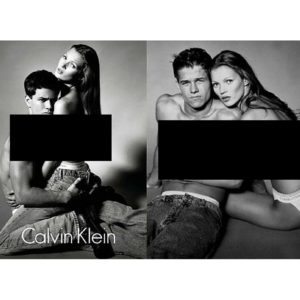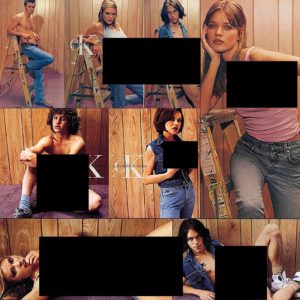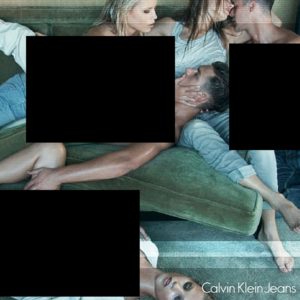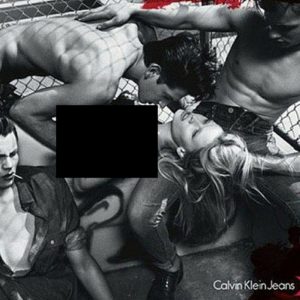Calvin Klein is known for its “daring” advertising, but in this case daring means using child pornography, drug culture, sexting, and sexual violence to sell clothing. Calvin Klein’s newest ad campaign, “erotica,” is coming under fire for its exploitive up-skirting ad, but this isn’t the first time Calvin Klein has used pornography and sexual exploitation to sell relatively conservative fashion.
The 1980s
Calvin Klein kicked off the 80s with a teenage model in sexually suggestive poses. It began with 15-year-old Brooke Shields making her Calvin Klein debut. At the end of a commercial that panned her sitting in a provocative position, Shields said, “Do you know what comes between me and my Calvins? Nothing.”
Here we have the beginning of Calvin Klein’s sex sells philosophy using minors. CBS eventually banned the commercial in response to public outrage.
The 1990s
But the use of minors in sexually suggestive advertising didn’t stop in the 80s. One  of Calvin Klein’s most notorious ad campaigns launched in 1992. This ad featured topless, 17-year-old Kate Moss straddling shirtless Mark Wahlberg.
of Calvin Klein’s most notorious ad campaigns launched in 1992. This ad featured topless, 17-year-old Kate Moss straddling shirtless Mark Wahlberg.
Only a year later Moss was featured in a Calvin Klein commercial promoting the brand’s Obsession perfume. Many people were outraged because the ad promoted the “Heroine Chic” look and glamorized drug use.
Even if the models weren’t underage, Calvin Klein went out of its way to make it look like they were. In 1995, Calvin Klein ads featured a group of provocatively posed models who looked like teenagers. President Bill Clinton even complained about the “half-dressed adolescents,” and the Department of Justice launched an investigation. While the investigation was eventually dropped due to Calvin Klein’s ability to prove that all the models were adults, the company still pulled the advertising campaign claiming that it was “misunderstood by some.”
 No, Calvin Klein we understood your ad completely: you were normalizing child sexual abuse images (i.e. child pornography).
No, Calvin Klein we understood your ad completely: you were normalizing child sexual abuse images (i.e. child pornography).
Calvin Klein kept with the child porn theme when it ended the 90s with an ad campaign featuring little boys and girls dressed only in underwear playing on a couch. Calvin Klein had planned to unveil a billboard in Time Square featuring two 6-year-old boys wrestling in nothing more than underwear, but the company cancelled the ad amid criticism. While the photographer said the ad “was intended to show children smiling, laughing and just being themselves,” the children were posed in highly sexually suggestive positions. If it had been a mom taking pictures of her kids destined for the family photo album, the pictures would have been acceptable. But destined for a 50-foot billboard in Time Square with no mom in sight, the high-definition image of young boys that clearly showed underwear bulges and sexually suggestive body part positions were unacceptable. Even the company admitted that the backlash, “raised issues that [they] had not fully considered.” The president of the American Family Association commented saying that the ads were, “nothing more than pornography.”
The 2000s
Unfortunately, Calvin Klein’s trend of sexually exploitive ads continued into the 2000s. In 2008, Eva Mendes was featured nude rolling around on a bed for Calvin Klein’s Secret Obsession perfume. The ad was banned from cable because of an excessive show of skin.
In 2009 Calvin Klein moved from its standard child-porn themed ads to a group- sex theme with an ad that was also eventually banned. This one featured a group of young adults mostly undressed in what looks like an orgy. The company released a commercial that looked like it was shot with a hidden camera. In it the undressed models feigned sex. Calvin Klein knew cable providers would quickly pull the ad, which they did, and released it online as well. YouTube also blocked the ad. A similar ad was posted on a billboard in New York City.
sex theme with an ad that was also eventually banned. This one featured a group of young adults mostly undressed in what looks like an orgy. The company released a commercial that looked like it was shot with a hidden camera. In it the undressed models feigned sex. Calvin Klein knew cable providers would quickly pull the ad, which they did, and released it online as well. YouTube also blocked the ad. A similar ad was posted on a billboard in New York City.
The 2010s
Calvin Klein further developed the group-sex theme into 2010 with a 50 foot billboard in New York City that depicted a foursome of one girl and three guys. The billboard was taken down shortly after in part due to a petition from the American Family Association that gathered over 15,000 signatures.
 But the group-sex theme only got worse. In 2010 Calvin Klein once again came out with an ad that depicted one girl and three guys, only this time it looked less like a foursome and more like a gang rape. The ad was quickly pulled from billboards in Australia.
But the group-sex theme only got worse. In 2010 Calvin Klein once again came out with an ad that depicted one girl and three guys, only this time it looked less like a foursome and more like a gang rape. The ad was quickly pulled from billboards in Australia.
Last year Calvin Klein’s ad campaign centered on sexting. Each ad featured an intimately posed couple along with suggestive sexts apparently “inspired by actual events and people.”
This month Calvin Klein launched its newest “controversial” campaign blatantly titled “erotica.” This campaign features a range of sexually suggestive images from the up-skirt image sparking the most controversy, to a model with her hands in her underwear and the tagline “I pulse in #mycalvins.” All of these ads are unacceptable, but the up-skirting ad takes the cake. Up-skirting is a growing sex  crime where someone takes pictures up a woman’s skirt or dress without their knowledge. Despite the fact that Calvin Klein has experienced widespread criticism of the ad, the company has refused to remove the image from the campaign.
crime where someone takes pictures up a woman’s skirt or dress without their knowledge. Despite the fact that Calvin Klein has experienced widespread criticism of the ad, the company has refused to remove the image from the campaign.
Join the outcry against Calvin Klein. Tweet #ICutCalvin to @Calvinklein and tell the company that voyeurism, sexual harassment, and sexual exploitation are never fashionable. You can also cut off the tags from your Calvin Klein clothes and send them in to the company in protest. Sign our petition here and learn more about how to join the campaign against Calvin Klein at endsexualexploitation.org/calvin.

